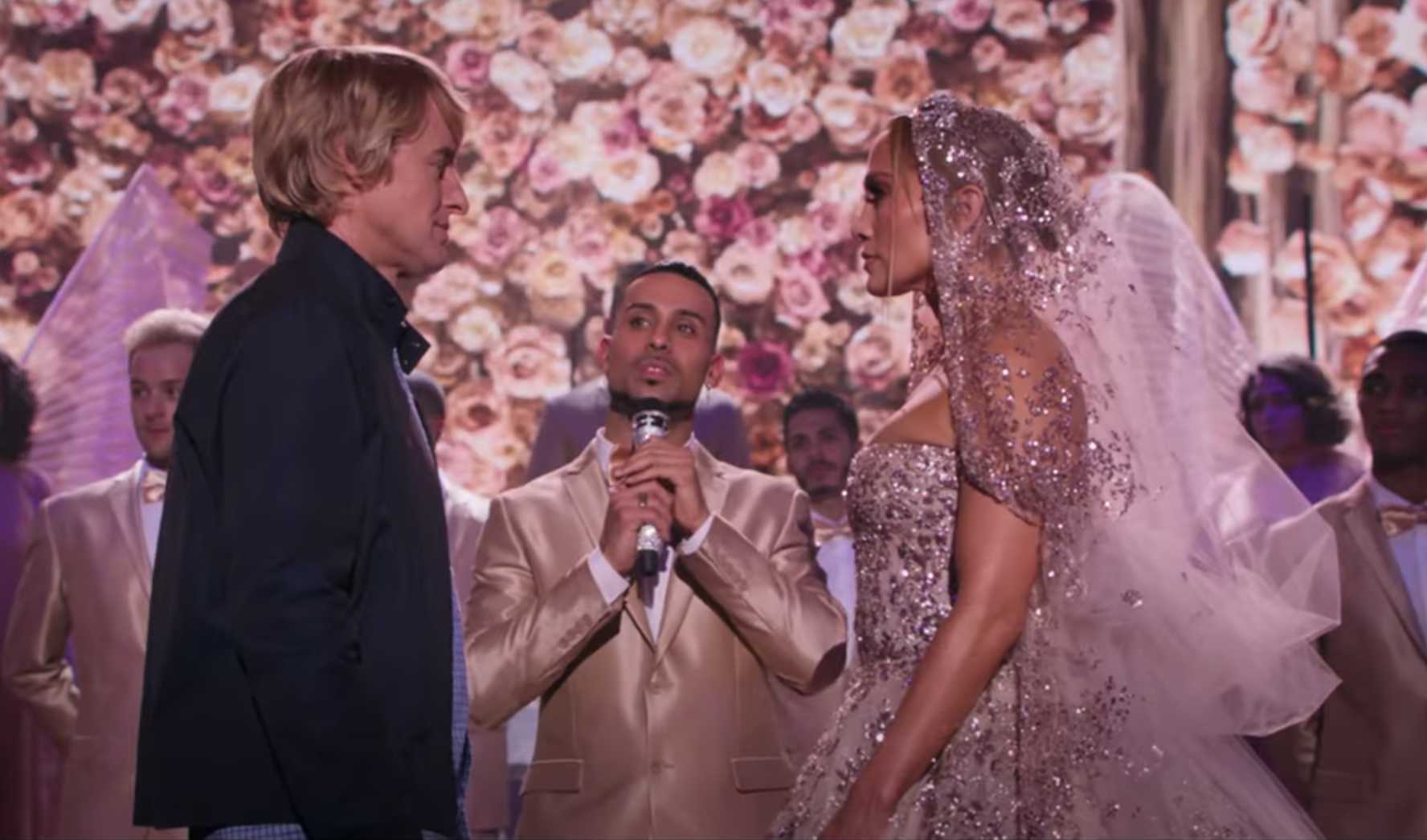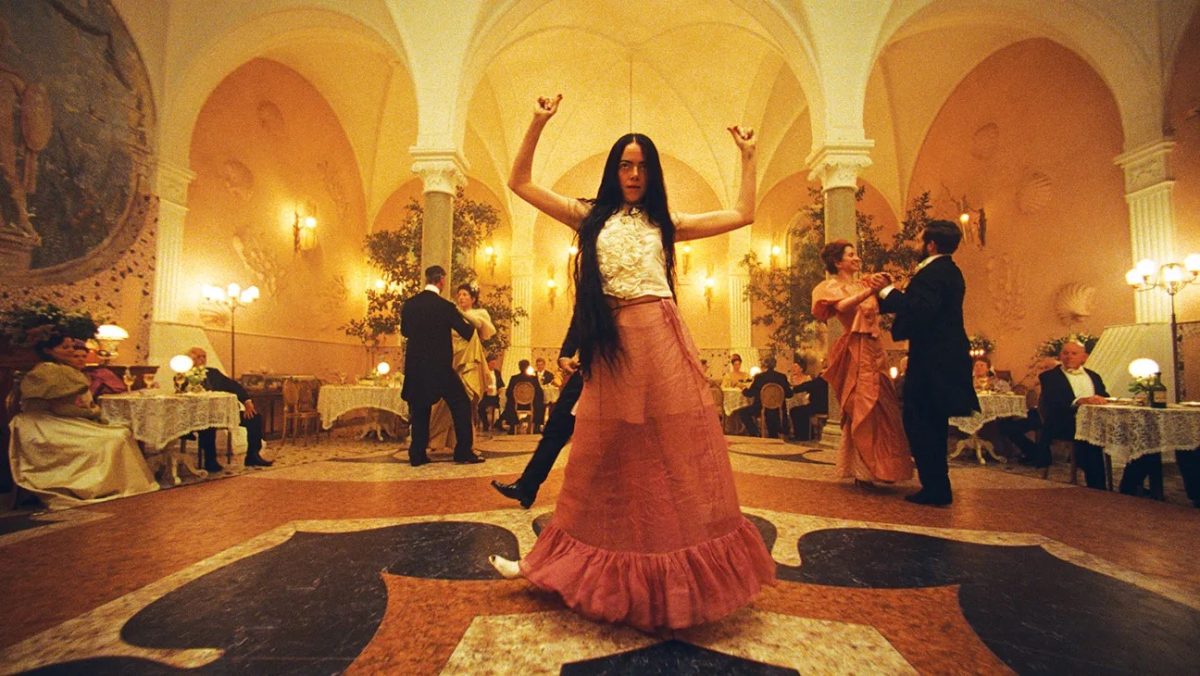After watching Jennifer Lopez and Owen Wilson’s “Marry Me,” Staff Writer Kaley Chun wonders what it will take to reinvigorate the rom-com.
The weekend before Valentine’s Day, the new romantic comedy “Marry Me” was released in theaters, as well as online for premium subscribers of Peacock. In the movie, Jennifer Lopez plays Kat Valdez, a pop star and international influencer. At a televised concert in which she is supposed to marry her fiancé and fellow performer Bastian (Maluma), she discovers clips of him cheating. As a result, Kat picks unassuming math teacher Charlie (Owen Wilson) out of the crowd and decides to marry him instead. In the aftermath of their hasty and public wedding, Kat and Charlie get to know each other. She is a beautiful celebrity, while he is a normal single father — over the course of their relationship, they have to ask: Are their vastly different worlds capable of coexisting?
The premise of “Marry Me” is implausible, but the romantic comedy genre is built on a foundation of far-fetched bets, coincidental meetings, and unlikely pairings. Part of this is the magic of movie-making, but also, luck is a part of love. Accidents happen, though in real life they usually do not involve the risky high stakes of marriage to a stranger. Even Kat is unable to fully explain why she felt compelled to marry Charlie, but she tells the world: “If you want something different, you have to do something different.” There are less drastic steps she could have taken, but it is a movie. The audience is asked to suspend disbelief and imagine a world where normal people can attain unbelievable good luck. If you can get past these flaws in logic, “Marry Me” is a fun film. Lopez and Wilson have an awkward chemistry that never fully makes sense, but they are two charismatic actors who light up the screen.
This film has its flaws, but some people refuse to take the romantic comedy genre seriously regardless of quality. “Chick flick” is a descriptor that devalues a film’s worth, and a plot focusing on love will immediately turn away certain audiences. Romantic comedies are rarely considered reputable, and part of the issue is that women’s perspectives in film are not as respected as men’s. As a result, the number of romantic comedies has shrunk over time and fewer audiences care to watch them in theaters. Though the genre includes countless iconic films such as “When Harry Met Sally” and “10 Things I Hate About You,” the relevance of the romantic comedy in pop culture has faded within the last few decades. The genre was popular and effective in the 90s and early 2000s because of its relatable characters and settings, but in recent years the film industry has been focusing less on romance and more on action films with guaranteed profit. “Marry Me” is a prime example of this change: it shows two people trying to harmonize their different lifestyles, it contains catchy original songs, plus Jennifer Lopez, Owen Wilson, and Maluma are all legitimate stars. On paper it should be a successful film anytime of the year, yet “Marry Me” was released at a pointedly chosen time. Are people only allowed to enjoy love the week of February 14th? Is that the only time a romance can be successful in the modern film landscape?
In recent years, popular culture has been spending its time and money on sequels, remakes, and films that hit familiar notes of comfort and nostalgia. There is nothing wrong with franchises, but unique, self-contained content is also important. Romantic comedies have been pushed to the side, but their lack of popularity is not due to a lack of interest. With Netflix’s aid, they are making a slow but steady resurgence. However, most of the streaming rom-coms are predictable, silly, low-budget attempts at creating thoughtless content to fill streaming platforms. Of the thin selection of contemporary romantic comedies, glamorous films like “Crazy Rich Asians” are few and far between, while low-budget adaptations like “The Kissing Booth” and “He’s All That” fall into the same acting and writing snafus as “Marry Me.” Lopez’s newest acting endeavor is a fine and fun film overall, but it misses the heart and the chemistry that characterizes the best films of the genre. Hopefully its existence points to a resurgence of charming romantic comedies, but unfortunately, it does not meet the mark itself.
Time will tell whether romance cinema has the capacity to make a serious resurgence. Will the genre ever again hold a place against the steep competition of traditional blockbusters? No genre is ever resolutely dead, and it is difficult to tell what stories will make a resurgence at any given time. It feels likely, because the desire for quality rom-coms exists. There is a low, steady clamoring for a new kind of revival instead of the millionth reboot this year. It may take years, and maybe the 90s rom-com is history, but putting two stars in a funny, romantic film can be magical. Finding the right plot, the right actors, and the right film is still a possibility. “Marry Me” is not going to be the film to inspire the reinvention of a classic genre, but it may be a step in the right direction. Though the romantic comedy revival is slow, Lopez and Wilson provide hope that someday, the film industry will recapture the power of movie star charisma and discover the heart in love stories once again.
Grade: C
Directed by: Kat Coiro
Starring: Jennifer Lopez, Owen Wilson, Maluma
Release Date: Feb. 11, 2022
Rated: PG-13
Image courtesy of Variety.

About the Contributor
Kaley Chun, Senior Staff Writer
Donate to The UCSD Guardian
$210
$500
Contributed
Our Goal
Your donation will support the student journalists at University of California, San Diego. Your contribution will allow us to purchase equipment, keep printing our papers, and cover our annual website hosting costs.







